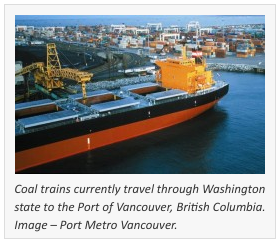Tuesday morning the U.S. House Energy Committee will learn more about barriers to and concerns about exporting coal and LNG. Read the briefing memo prepared for Committee Members and staff.
 More specifically, the following questions will be addressed during the hearing:
More specifically, the following questions will be addressed during the hearing:
- What specific barriers are there to exporting coal and LNG in the U.S.?
- What impact can these barriers have on the export of coal and LNG?
- What role, if any, should Congress play in removing or amending these barriers?
There are significant transportation issues involved in expanding coal and LNG exports. Increased rail traffic would impact communities, and road improvements may be needed in a number of places.
However, a new study suggests that additional coal trains could reduce the costs of transportation improvements, and reduce transportation costs for other commodities. Authored by Western Washington Kaiser Professor of International Business, Dr. Steve Globerman, the report for the Washington State Farm Bureau reveals three key findings:
1. Coal shipments are likely to lower costs to other shippers by improving the economics of infrastructure investment and operation in Washington;
2. More efficient import and export capabilities generate economic benefits for terminal customers, including agriculture. Those “upstream” benefits have not been quantified to date; and
3. Existing economic studies likely underestimate the economic benefits from the terminals, and understate how broadly those economic benefits may be dispersed. (“Coal Exports from the Pacific Northwest and the Economic Growth of the Northwest Economy“)
Seattle Mayor Mike McGinn opposes expanding coal exports, and will testify during the House hearing. See below for his prepared remarks. Also testifying against expanded exports is KC Golden of Seattle-based Climate Solutions (read his statement.)
Two other witnesses offered some interesting prepared remarks.
Lucian Pugliaresi of the Energy Policy Research Foundation says in his prepared statement:
“Coal production from the Powder River Basin (PRB) is relatively low cost including rail and shipment costs to Asian destinations. Coal production from the PRB can be produced and delivered to Asian markets at prices that will merely replace higher cost production with relatively small effects on world coal prices. Neither net world coal combustion nor GHG emissions will change substantially as a result of an expansion of U.S. PRB exports.” (Our emphasis.)
Hal Quinn, of the National Mining Association says about what you would expect, but this caught my eye (statement):
“The economic benefits of U.S. coal exports extend well beyond the coal fields. Coal exports create jobs throughout the supply chain that include rail, barge, port operations, cargo handling and goods and service suppliers to each of these links in the supply chain. Coal exports comprised 16 percent of the total vessel weight of exported goods passing through U.S. ports. Coal export facilities located in Virginia, Louisiana, Maryland and Alabama alone generated $5.5 billion of economic activity and supported more than 45,000 jobs. The economic lift provided by coal exports in these states underscores the potential for other states, especially on the West Coast, to benefit economically from sharply rising coal demand from Asia.”
Learn more from opponents of coal exports, and from supporters. Seattle-based NPR radio station KUOW has been following the coal exports issue closely at Coal In The Northwest.
McGinn House Testimony re Coal Exports
…
Larry Ehl is the founder and publisher of Transportation Issues Daily. In the public sector, Larry was Federal Relations Manager for Washington State DOT; Chief of Staff to US Senator Slade Gorton; and was twice elected to the Edmonds School Board.
Tags: Coal Exports, Congress, Larry Ehl, Transportation Issues Daily






 RSS Feed
RSS Feed